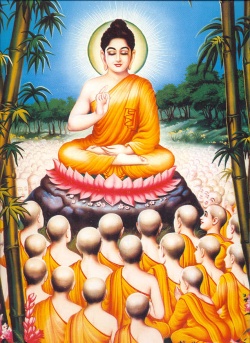Difference between revisions of "Anattalakhana Sutta"
m (Text replacement - "The Buddha" to "The Buddha") |
m (Text replacement - "Category:Pali terminology" to "{{PaliTerminology}}") |
||
| Line 13: | Line 13: | ||
[http://www.palikanon.com/english/pali_names/ay/anattalakhana_s.htm www.palikanon.com] | [http://www.palikanon.com/english/pali_names/ay/anattalakhana_s.htm www.palikanon.com] | ||
[[Category:Buddhist Terms]] | [[Category:Buddhist Terms]] | ||
| − | + | {{PaliTerminology}} | |
[[Category:Sutras]] | [[Category:Sutras]] | ||
Revision as of 12:46, 27 April 2014
Anattalakhana Sutta/Vatthu: Preached five days after the Dhammacakkapavattana Sutta to the Pañcavaggiya Monks, all of whom became Arahants at the conclusion of the sermon (Vin.i.13-14; J.i.82; iv.180; Dpv.i.34; MA.i.390; AA.i.57, 84).
No self is to be found in any of the five Khandhas, all of which are impermanent and subject to woe. The Sutta does not deal with the question as to whether the self exists or not; it only shows that the Khandhas are not the self. In the Samyutta Nikāya (iii.66f ) the discourse is called the Pañca Sutta, the five referred to being the Pañcavaggīyā who listened to it.
Anattalakhana Vatthu
The story of five hundred Monks. The Buddha, knowing their past, advises them to reflect on the "selfishness" of the Khandhas (DhA.iii. 406-7). These Monks had devoted themselves to Meditation on this topic for 20,000 years in the dispensation of Kassapa Buddha.
